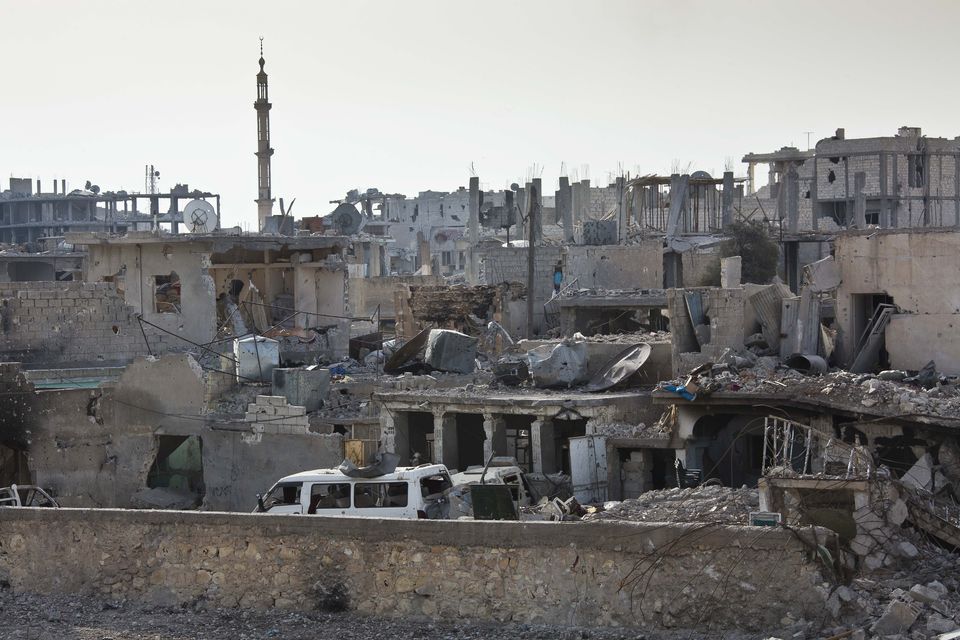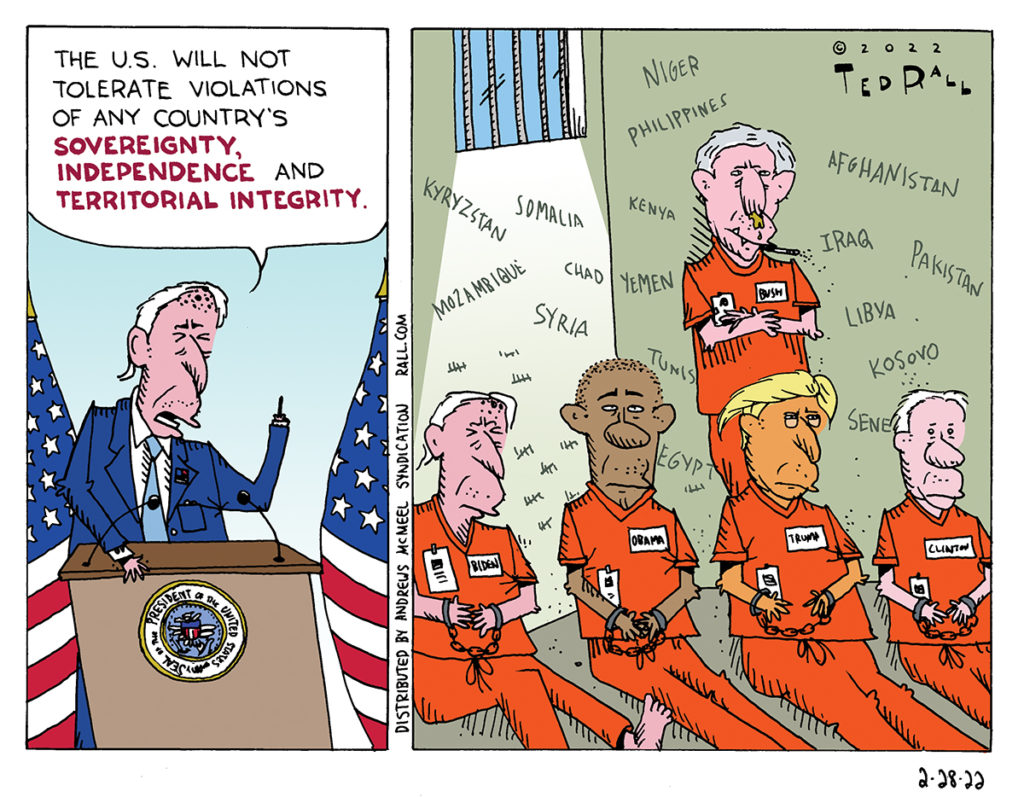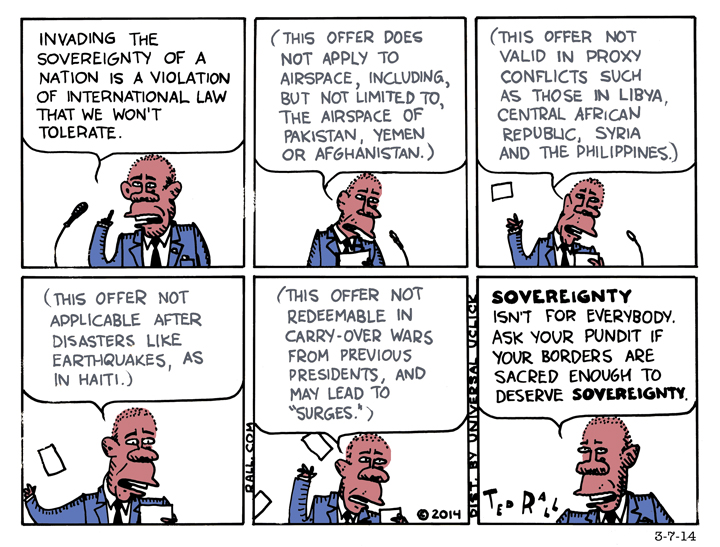The United States doesn’t have much moral high ground to criticize Russia’s incursion into Ukraine considering the fact that it constantly violates the sovereignty of other independent nations with drone attacks, airstrikes, CIA coups and outright invasions and occupations.
SYNDICATED COLUMN: Why Are We At War with ISIS?

Is there any justification at all for bombing ISIS?
There isn’t any Congressional authorization, much less a declaration of war. Is there even a good reason for the U.S. to be involved?
There is no better time to ask this question than now, as much of the world (me included) is disgusted by the Islamic State’s beheadings of two kidnapped Japanese nationals, the second one an acclaimed journalist and humanist who lost his life trying to rescue the first.
It is easy to forget, too easy, that for Americans going to war was until recently an act undertaken only after every other alternative had been thoroughly explored and completely exhausted, that the bar for casus belli was high, and that war wasn’t the standard response to outrage or international crisis, but quite unusual, a deviation from the normal order of business. Hard to imagine now, but the United States did not declare war against Germany after its U-boat torpedoed and sank the RMS Lusitania in 1915, killing 1,198 passengers, including 128 Americans. Instead, President Woodrow Wilson demanded compensation and a promise from Germany not to do it again.
War has since become much too easy.
We go to war fast, without national discussion — much less debate. We go to war indiscriminately. We war against several nations (Afghanistan, Iraq, Libya, Syria), at the same time we’re warring against a tactic (terrorism), as well as various so-called “non-state actors” (discrete branches of Al Qaeda, Khorasan, Abu Sayyaf). War, war, war, all the time. So much war we think it’s normal that, especially when someone/something/some group does something we deem wrong, like slitting the throats of reporters as GoPros record the bloodshed in glorious high resolution, war is the knee-jerk response.
Yet, as the Lusitania example reminds us, this was not always the case, and so this is not how it necessarily must be.
In just one single day over the past weekend, the U.S.-led coalition carried out 27 airstrikes against ISIS-held territory in Syria and Iraq. We have no way to know how many ISIS soldiers, and civilians, were killed or wounded in those bombardments.
U.S.-led forces are responsible for at least 16,000 airstrikes against ISIS in the last six months, killing an unknown number of people — but guesstimates logically begin in the tens of thousands, including civilians. Despite all that carnage, the air campaign has not had the desired effect: ISIS is stronger than ever, continuing to conquer new territory and consolidate control over old ground, and the authoritarian government of Syrian President Bashar al-Assad, an adversary of the U.S. its ally Israel, is benefiting as well.
American war officials concede that the air war is failing. “I think [the war against ISIS] may require a forward deployment of some of our troops,” U.S. Secretary of Defense Chuck Hagel told CNN. “I would say we’re not there yet. Whether we get there or not, I don’t know.”
“This is going to be a long, nasty, dirty war that in many ways is going to look a lot like the first go-around in Iraq,” Stephen Biddle, ex-adviser to Army General David Petraeus, told U.S. News & World Report.
But…why?
Why are we in this “long, nasty, dirty war” against ISIS?
Why aren’t we asking why we are at war against ISIS?
No one is arguing that the Islamic State is run by nice people. ISIS has carried out ethnic cleansing, enslaved women, raped children, slaughtered POWs in summary executions and Talibanized areas under their control, imposing their brutal, brutal medieval version of Sharia law on citizens accustomed to modern life under socialist, secular states.
But ISIS is not alone in its barbarism.
Saudi Arabia routinely carries out public beheadings and floggings, as well as crucifixions, and treats women like dirt. Yet we don’t bomb them. To the contrary, the Saudis are close allies. President Obama cuts short important diplomatic trips in order to join the Saudis as they mourn their dead king.
Another close U.S. ally, the government of the Central Asian republic of Uzbekistan, either boils or freezes political dissidents to death, depending on the government’s mood. Quirky! No air raids there either.
Among the worst nations on earth for human rights abuses are Yemen and Pakistan, both of which like ISIS are fundamentalist Islamist regimes, but receive hundreds of millions of dollars in American weapons and cash.
So what’s special about ISIS? Why did we go to war against them?
“When it comes to human rights abuses, they (Islamic State militants) are in a class of their own,” Senator Barbara Boxer (D-CA) said last summer in support of a Congressional resolution supporting America’s newest war. But that’s not true. ISIS is no worse than any number of other regimes we choose to leave alone (or actively support).
The New York Times’ editorial board says ISIS “poses a dire threat to the United States and its allies.” How so? They can’t attack the U.S. Yes, they’re in Iraq, which we kinda sorta view as an ally after invading it, but that war was lost in 2003. ISIS can’t invade Israel. So why are we attacking them? And why aren’t we asking why?
War is serious business. It takes lives, costs money, destroys infrastructure and the environment, and creates new problems, including laying the ground for future wars. The least — the very least — we can do is think about it, and talk about it, before starting one, and then letting inertia carry it on.
(Ted Rall, syndicated writer and cartoonist for The Los Angeles Times, is the author of the new critically-acclaimed book “After We Kill You, We Will Welcome You Back As Honored Guests: Unembedded in Afghanistan.” Subscribe to Ted Rall at Beacon.)
COPYRIGHT 2015 TED RALL, DISTRIBUTED BY CREATORS.COM
SYNDICATED COLUMN: Torture is an All-American Value

Dianne Feinstein, chairman of the Senate Intelligence Committee and long-time-until-recently NSA apologist, claims to be shocked by an internal CIA report that documents the agency’s grisly record of torture after 9/11. “The report exposes brutality that stands in stark contrast to our values as a nation,” Feinstein said April 3rd. “It chronicles a stain on our history that must never again be allowed to happen.”
Among the “stunning revelations” that have leaked out of the still-classified 6,600-page CIA torture report are stories that long-time followers of my writing have long been aware of, having read about them in my column during the Bush years. Guantánamo isn’t just a concentration camp; it’s also a CIA “black site”/torture dungeon, as was a joint US-UK “extraordinary rendition” depot on the Indian Ocean island of Diego Garcia. The CIA outsourced torture to Third World shitholes/U.S. allies, knowing/expecting/hoping that they would be murdered.
Disgusting stuff. For sure. Yet there’s something even more nauseating — and infinitely more dangerous — than a country that tortures:
A nation in denial about its true values.
Feinstein speaks for most Americans when she characterizes War on Terror-related torture as an aberration. But she’s mistaken. Conventional wisdom is wrong.
Torture is as American as red, white and blue.
Like the citizens of Nazi-occupied Europe during World War II who had a pretty good idea that those eastbound trains were a one-way ticket to hell, Americans have known since the beginning of the War on Terror that their government was going to torture, was torturing and had tortured. It is still torturing today. Yet hardly anyone complains.
Five days after 9/11, on September 16, 2001, Dick Cheney told Tim Russert on “Meet the Press”: “We also have to work, though, sort of the dark side, if you will. We’ve got to spend time in the shadows in the intelligence world. A lot of what needs to be done here will have to be done quietly, without any discussion, using sources and methods that are available to our intelligence agencies, if we’re going to be successful. That’s the world these folks operate in, and so it’s going to be vital for us to use any means at our disposal, basically, to achieve our objective.”
At the time, everyone knew what that meant.
The Vice President of the United States, speaking on behalf of the President, had announced to the world that the gloves were off, that the “quaint” Geneva Conventions were history. That the U.S. would torture.
Had Cheney’s endorsement of “brutality” been “in stark contrast to our values as a nation,” as Feinstein puts it, there would have been political blowback. Imagine if the president of, say, Sweden, had said the same thing. The dude would’ve been out of a job.
Au contraire — Cheney’s siren call to the “dark side” drew mainstream political approval, even from self-identified “liberals” in the corporate media.
In October and November of 2001, Newsweek‘s Jonathan Alter, FoxNews’ Shepard Smith (usually the network’s calm voice of reason), and CNN’s Tucker Carlson jumped on the torture bandwagon. All three reporter-pundits called torture a necessary, lesser evil in the fight against Islamist terrorists. Carlson (he’s the one with the bowtie): “Torture is bad. Keep in mind, some things are worse. And under certain circumstances, it may be the lesser of two evils. Because some evils are pretty evil.”
“Mr. Alter said he was surprised that his column did not provoke a significant flood of e-mail messages or letters,” reported The New York Times. “And perhaps even more surprising, he said, was that he had been approached by ‘people who might be described as being on the left whispering, I agree with you.'” (Or, more precisely, by people who were formerly on the left.)
If torture were repugnant to Americans, Cheney — and his pet pundits like Alter — would have met with a firestorm of criticism. They would have been fired. They were not.
By January 2002, the United States had defeated the Taliban and installed Hamid Karzai as the leader of a U.S. puppet regime in Afghanistan. Still, public tolerance/approval of torture continued. A famous legal scholar, Alan Dershowitz, published an op/ed calling for the creation of “torture warrants”: “The warrant would limit the torture to nonlethal means, such as sterile needles, being inserted beneath the nails to cause excruciating pain without endangering life.”
These are the words of a madman.
By objective standards, if the U.S. were a nation where torture stood “in stark contrast to our values,” Dershowitz would have been shouted down and ridiculed. It would be hard to imagine Harvard Law — Harvard Law! — keeping such a raging nut on its payroll. But they did.
Because torture is not at against our values. Not in the least.
Dick Cheney: not forced to resign.
Jonathan Alter, Shepard Smith, Tucker Carlson: all still legit, all still capable of landing big book deals and big speaking fees. They run in circles where real lefties like me — who bitched about CIA torture and kidnapping in countless cartoons and columns — are blackballed.
Which makes perfect sense. Because Americans love torture. A dozen and a half years after 9/11, 68% of Americans still tell pollsters — even though it’s been proven ineffectual — that torture is A-OK.
A polarized nation? When it comes to anally raping young men with flashlights and broomsticks — that happened at Gitmo and the U.S.-run Bagram torture center, and may be continuing — we’re still United, We Stand.
So when newly-minted President Barack Obama told Americans in 2009 that he planned to “look forward, not back“— i.e., not holding anyone accountable for Bush-era torture — and visited Langley to assure nervous torturers that they could chillax, no one cared.
When government-sanctioned torture continued under Obama, no one cared.
Even when Americans rose up in 2011 to protest their government, as part of the Occupy Wall Street movement, torture was less than an afterthought on the activists’ menu of complaints.
American “progressives” don’t care either. There has never been a mass demonstration against torture. (Well, not in the U.S. There have been big marches in Egypt and Bahrain.)
Torture against American values? Hardly. From American troops who mutilated the genitals of Native Americans to waterboarding Filipino independence fighters in the early 20th century to organized rape gangs in Vietnam, torture has been all-American.
(Support independent journalism and political commentary. Subscribe to Ted Rall at Beacon.)
COPYRIGHT 2014 TED RALL, DISTRIBUTED BY CREATORS.COM
War on War
What if we devoted a proportional number of financial and other resources to threats other than terrorism?
NOTE: My apologies to people who commented on this cartoon post. Due to a glitch in WordPress, I was forced to delete this post and put it back up. Regrettably, in the process, your comments were lost. I always make every effort to avoid this sort of thing, and I am sorry.



